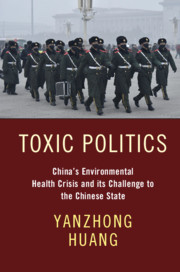'Dr Huang has animated a dry subject and brought it to life. He elegantly combines environmental science, public health, political science, organizational behavior and his own family and hometown experiences. The writing style is approachable and yet also very careful and precise. The book is a tremendous read. It is a worthy successor or update of Liz Economy’s The River Runs Black of 2004. Moreover, this is much more than a scholarly work. The subject and analysis elucidate the conditions that at least 1.4 billion Chinese citizens face every day. The spill-over effects of the problem-set that he so eloquently unpacks here will have obvious global consequence. I only hope that the book is translated into many languages. But, most importantly, I hope that it is translated into Chinese and read widely by members of the Chinese public as well as the political establishment in China.'
Craig Allen - President, US Ambassador (ret), US-China Business Council
'Yanzhong Huang has accomplished a remarkable achievement: he offers us a comprehensive, truly interdisciplinary study of interrelated Chinese political, economic, and societal dynamics through a deep dive into the relationship between two vitally important policy areas, environmental degradation and its effects on citizens’ health.'
Andrew Mertha - George and Sadie Hyman Professor and Director of China Studies, Johns Hopkins University
'Bringing well-researched data to life through poignant personal narratives, Huang documents devastating air, water, and soil pollution—and the Party’s conflicted approach to acknowledging and addressing its toll on citizens’ health. To understand some of China’s most pressing challenges now and in the future, read this book!'
Dr Andrew S. Erickson - Professor, Naval War College; Visiting Scholar, Harvard Fairbank Center
'This book addresses a key question as to how a major environmental health crisis may influence China’s rise. The book systematically reviews the fundamental economic, sociopolitical, foreign policy and health implications of the crisis and its policy response. The book also offers an intriguing assessment of the evolvement and implementation of environmental health policies in China. It is a must-read for those who are interested in global environmental health and policy issues.'
Xi Chen - Associate Professor at Yale University; President, China Health Policy and Management Society
'Toxic Politics does not hedge or equivocate. China must first heal its body politic before it will effectively address its environmental slide and heal its people. Willing participation by citizens in environmental and health action, as well as in overall governance, is necessary for a healthy environment and a sustainable great power.'
David M. Lampton - Oksenberg-Rohlen Fellow at the Asia-Pacific Research Center, Stanford University, and former director of China Studies, Johns Hopkins-SAIS
'Yanzhong Huang’s Toxic Politics is a gem of a volume. This historically grounded, multidisciplinary analysis clearly explains not only China’s wide ranging environmental problems and their devastating public health consequences but also the political, bureaucratic, social and international factors that have stimulated - and also distorted and weakened implementation of - policy initiatives to ameliorate these problems. Policy success, he argues, will require additional profound changes in the country’s state-market relations, bureaucratic power structure, and state-society relations. Otherwise, he concludes, China’s environmental health issues have profoundly negative implications for its future economic growth, socio-political stability, and foreign relations.'
Kenneth G. Lieberthal - Senior Fellow Emeritus, Brookings Institution
'Toxic Politics is a must read for the times we live in. Focused on the impact of the ‘dark cloud’ of environmental degradation on public health in China, this comprehensive and fascinating book not only provides new information on the consequences of pollution on an array of diseases and health concerns, but also examines the Chinese political system that allowed this toxic pollution to happen, along with the many challenges and conflicts now faced as it struggles to address them. While environmental health and governance may be the focus of this meticulously researched work, Yanzhong Huang offers much more. As the world grapples with the COVID-19 pandemic, as well as a host of other pressing global problems, Toxic Politics is full of valuable insights into how the Chinese government responds to crises that will matter to us all.'
Margaret A. Hamburg, MD - Foreign Secretary, National Academy of Medicine and past-president of the American Association for the Advancement of Science
'In this astonishingly prescient analysis, Yanzhong Huang zeroes in on the vital link between China’s political health and its physical health. His tough, fair-minded, deeply knowledgeable book not only diagnoses grave problems lurking behind China’s environmental progress but also provides a cautionary note about China’s bid for global leadership. Anyone who wants to predict China's growth prospects needs to read this.'
Evan Osnos - author of Age of Ambition
'Toxic Politics is a fascinating, lively, and authoritative account of the successes and failures of China’s environmental authoritarianism particularly under Xi Jinping. Essential reading for anyone worried about pollution and health in China. I can’t think of a better book for teaching political science students about Chinese politics and policy making.'
Susan L. Shirk - Research Professor and Chair, 21st Century China Center, School of Global Policy and Strategy, UC San Diego
‘Huang’s book combines rich knowledge and profound insight about China’s environmental health crisis and it should be treated seriously by those interested in understanding more about the Chinese state’s environmental health crisis and government response.'
Genia Kostka
Source: The China Quarterly
‘… Toxic Politics is one of the most readable texts on China and the environment. Readers in search of a well-written book on this topic need look no further.’
Yifei Li
Source: Political Science Quarterly



